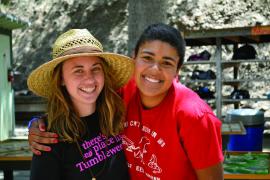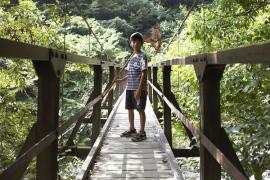You could be working an hourly job at some retail store or restaurant or engaging in free labor in an office internship.
But let’s face it, most likely no one will remember the person who sold them a coffee this morning, and most interns will get tired of observing the action but never being a key player in the midst of it. By choosing to work at summer camp you have set yourself apart.
Elsewhere, adults and peers would barely notice or pay attention to what you have to say or contribute. Working at camp is different.
The kids you work with this summer will remember you, some of them for the rest of their lives. What you gain inside yourself while spending your summer outside with kids can give you a huge advantage in life. Your decision to work at camp will help you “up your game” on the path to becoming a respected adult.
You are on a unique journey now. You are leaving behind the ordinary world and helping create an “outside the ordinary” place where people laugh far more than they cry, have fun far more than they get bored, coexist peacefully far more than they stay in conflict, and often connect more deeply in a few days than some people will in a lifetime.
This journey happens in a place where it does not come at a cost to be unique or with the sacrifice of changing who you are to be accepted. At camp, you are free (and encouraged) to be yourself.
To make this camp world extraordinary demands that you leave behind what is ordinary and familiar.
In the ordinary world you can get away with:
- The mindset that anything not fun can be done later or avoided altogether. At camp you are a professional, not a procrastinator. Your actions, or lack thereof, impact the greater community. Other people are counting on you to take care of them or pull your weight in a shared responsibility.
- The attitude that “good enough” is enough. Maybe it is enough for making your bed, but not for ensuring your campers and coworkers leave camp feeling bigger and better about their lives than they did before they arrived.
- Tuning out, retreating, and distracting yourself with mindless screen time when things get challenging or you have a few minutes to kill. At camp you will learn to dig in, step up, and perform under pressure. You will also come to appreciate the “quiet” opportunities being unplugged and immersed in nature affords.
- Doing everything yourself. Here you will need to rely on others more often than not. You are part of a team of staff responsible for a group of kids, a program activity, putting three meals a day on the table, the upkeep of the facility, or the overall wellness of the camp community.
- Sitting back and waiting for others to do things for you. Your camp leaders will train, guide, and support you, but at camp the work only gets done when you and your fellow staff make it happen.
- Leaving contacts via message “unread” or “on read,” being passive aggressive, or playing mind games with others. Here the go-to form of communication is face-to-face. You will see the people you interact with every single day. Being kind, clear, and direct goes a long way in working through inevitable and normal conflict both quickly and cleanly.
Whether it is your first time at summer camp or you’ve been attending for a while, leaving one world and entering another may present a struggle. The camp lifestyle may require an adjustment. Or you may experience instant relief in leaving the ordinary world behind. Regardless of which group you fall into, you will benefit enormously by developing one particular skill. You can call on this powerful skill often throughout the summer and far into the future. This life-altering skill is the mental martial art of readiness!
Controlling Your Internal State
The real test of a person’s character is not how they behave when things are going their way, but how they respond when things get tough.
Real power is in the ability to control your internal state, stay on an even keel, and respond as the best version of yourself. It means showing up as a mature adult — not an impulsive or overwhelmed adolescent — every day in every situation. This includes when things are hard and not the least bit fun and when you are tempted to hide behind your device, do things your own way or have someone else do them for you, or resort to passive-aggressive tendencies.
How do you train yourself to do this?
You must learn to think and act differently than you did in the ordinary world. And this is something you can learn and practice now — in the weeks ahead of camp. Training to be proficient in readiness will empower you to be poised as a confident and focused leader in the extraordinary world of camp (and beyond). Think of “readiness” as a martial art that is both mental and physical — one that contains two components: something you say to yourself and something you do physically with your body.
First, Your Maturity Mantra
Take a good, introspective look at who you are at your core and put that into words. Knowing this will provide a compass as you move forward so that you can stay the course when feeling unsure, or even lost, down the road. Your mantra will be the word or phrase that helps put your mind into readiness mode so you are poised to act as a mature adult. Brainstorm and jot down words that describe who you are at your best. Include adjectives that surface easily (such as kind, creative, respectful).
When you feel like your list is complete, then start the process of narrowing it down to just one word. Cross off any words that maybe don’t represent who you are the majority of the time. The remaining word should be the term that people who know you and see you when you are at your best would say about you without hesitation. This final word can be backed up by your actions regardless of the situation. If someone unbeknownst to you followed you around for a day and observed what you said and did in your interactions with others when you were being your best self, they would arrive at this same (or a synonym of the) word.
Set Your Intention
Set your intention for who you are striving to be at the onset of each day.
To initiate this, incorporate your final word into some sort of mantra. It could be a statement, such as: “Today I will strive to be respectful of everyone and everything, creative instead of reverting to the way it’s always been done, or congruent with my words and actions.” Or it could be a simple phrase: “Respect always.”
Then at the end of each day, reflect back and see how you did. “Did my actions today show that I was respectful, creative, or congruent?” “In what ways can I do better tomorrow?”
Find comfort in knowing that you are human; therefore, you are not perfect. Any missteps are opportunities to reset in order to grow toward the person you would like to be.
Next, Your Power Posture
Think about any sport you’ve ever seen or played. One thing they all have in common is training the athlete to assume what is often called a “ready position.” This ready position involves some sort of physical movement that brings a person into a balanced center of gravity. When in this position, the maximum force and range of movement needed to excel at the activity are activated. Having a person bend their knees is a universal physical trait a wide variety of sports activities share. It effectively lowers a person’s center of gravity and prepares them to move or shift as needed. If you really think about it, it is hard to come up with any sport that doesn’t begin with taking control of your center of gravity by bending your knees.
The Significance
You most likely know the expression “to be in your head” and also the experience of someone “getting on your nerves.” You may even have had something happen and describe it as being “thrown off,” or someone says or does something, and you are “taken aback” by it. Every one of these expressions describes what happens when you lose your center of gravity. Literally, this is what happens when your body tenses and you lose your center of gravity.
Train yourself in a moment of pressure (this is normal and will happen at camp) to slightly bend your knees and lower your center of gravity — assume your ready position — and you will immediately regain command of your thinking and ability to be in control of your actions. Try it. The next time someone annoys you, or something happens that irritates you, slightly bend your knees and lower your center of gravity. You can even do this while sitting simply by relaxing the muscles around your belly and waist and letting your breathing drop lower into your diaphragm.
This ready position is one of the keys to staying on an even keel. This may or may not come easily to you. Even if it feels awkward the first couple of times you employ this method, the more you do it, the more natural it will feel. The benefit of keeping with it is that you will find yourself being level-headed and resourceful in situations where in the ordinary world people typically are not.
The Dynamic Duo
The combination of your maturity mantra (what you say to yourself) and power posture (what you do with your body) now becomes your default any time you experience stress or frustration at camp (and in life). Achieving both mental and physical presence at the same time gives you the acumen that may have been lacking in the ordinary world. In the extraordinary world of camp, fine-tuning the mental martial art of readiness puts you in control of just about any situation that may arise.
On your journey to learn this new skill of readiness, you may find that you are more patient, more positive, and more playful. You will react like your best self, not the ordinary self. You will know what it feels like to act as a mature adult and be respected as one by campers, peers, and leaders. The more you practice readiness, the more this new way will become your ordinary. It will be one of the many magical, unexpected, lifelong gifts that your decision to work at summer camp imparts.
|
Discussion Questions:
|
Photo courtesy Girl Scouts of Greater Mississippi Camp Wahi, Brandon, MS
Author’s Note: For those of you who are involved in the planning and executing of precamp staff training: One of the biggest “complaints” we receive as trainers who do this stuff is that even with the best possible design and presentation of all the things staff need to know to do their job, in the end, it falls short. We often hear that staff aren’t “mature enough” or “ready” to take on the demands of working with youth at camp. If this resonates with you, then we encourage you to incorporate “the mental martial art of readiness” as a key part of your staff training and notice the difference this summer!
Kim Aycock, MST, has several decades of experience equipping young people with skills robots are unable to do. While blending the talents of a master teacher with the knowledge of a seasoned camp expert, Kim ignites learning for varying levels of camp pros worldwide through her interactive and innovative presentations. Kim speaks at regional and national conferences, contributes regularly to Camping Magazine and ACA blogs, and serves as co-chair of ACA’s Staff Recruitment & Retention Committee. Contact Kim through her website at kimaycock.com.
For three decades, Jeffrey Leiken, MA, CEO, has been an influential voice in the field of youth development. He’s presented to over 100,000 professionals, parents and teens on four continents, been a featured TED speaker and consulted with over 300 summer camps. He is the author of Adolescence Is Not A Disease and has a private practice mentoring bright, sensitive, thoughtful teens and young adults. He is known for his poignant stories and insights that lead to lasting change in the lives of youth. Jeffrey can be reached through his website at EvolutionMentoring.com.



